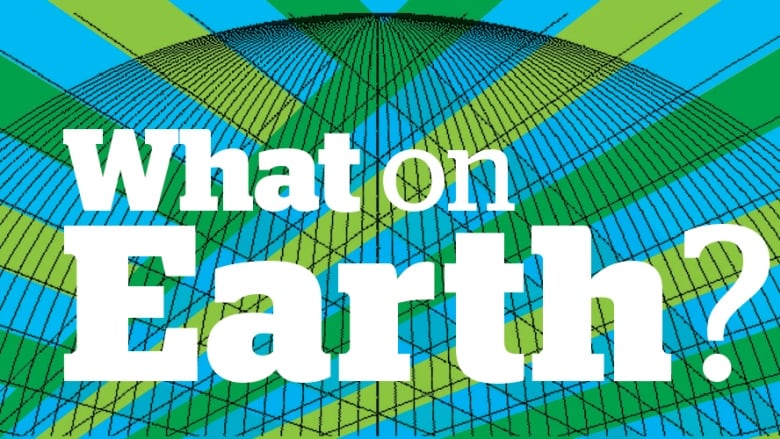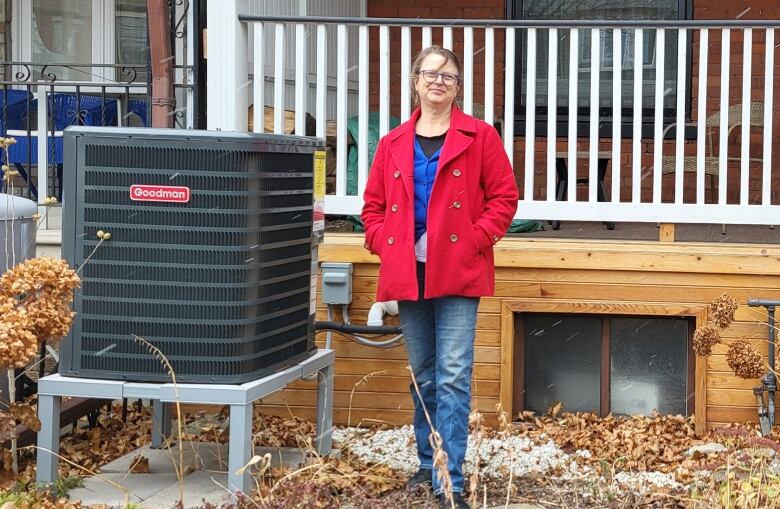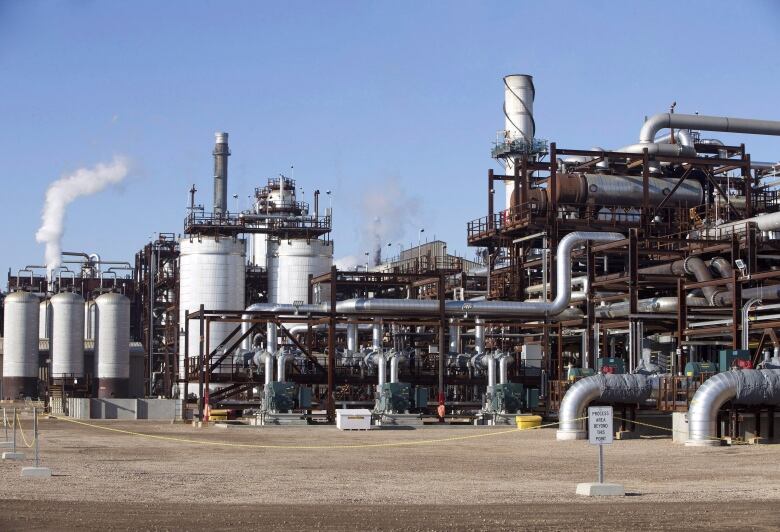How's this for a prize? This woman won a heat pump
Also: The environmental impact of rocket launches

Our planet is changing. So is our journalism. This weekly newsletter is part of a CBC News initiative entitled "Our Changing Planet" to show and explain the effects of climate change. Keep up with the latest news on ourClimate and Environment page.
Sign up hereto get this newsletter in your inbox everyThursday.
This week:
- How's this for a prize? This woman won a heat pump
- The environmental cost of rocket launches
- At COP28, countries will be fighting over these fossil fuel phrases
How's this for a prize? This woman won a heat pump

Last December, Madeline Koch learned she had won a big prize. It wasn't an SUV or a vacation. No, it was something she was way more excited about: a heat pump.
"I've never really won anything certainly nothing of such high value," she said. "I feel very, very lucky."
How it happened is a bit of a tour of the ecosystem of neighbours, activists and businesses that are helping communities come together to help each other transition to a lower-carbon world something we've previously seen in places like Montreal, Calgary, many Indigenous communities, Charlottetown and Toronto's east end.
In the summer of 2022, Koch moved into a century-old semi-detached house in Toronto's west end. The home was heated with a gas furnace and had no air conditioning. Koch, who is concerned about the climate, decided she would get a heat pump to provide cooling and cut her carbon emissions from heating.
But she figured it would make sense to live in the house for a year first so she could compare the two systems later.
Koch joined the street's online mailing list, and found she had many new neighbours who were concerned about the climate, too. Among them was Sarah Lazarovic, who puts out a weekly newsletter called Minimum Viable Planet, which focuses on how to fight the climate crisis. Koch signed up.
A few months later, in November, Koch was at the G20 meeting in Bali. She's the executive director of the G20 Research Group at the University of Toronto, and was producing reports on how well the summit was fulfilling its commitments, including commitments to fight climate change.
While switching planes in Taipei, Taiwan, Koch checked her email and found out in Lazarovic's newsletter that there was a contest where you could enter to win a heat pump. Koch promptly did so.
The contest was run by Richard Laszlo, a Toronto energy consultant. For years, he says, he had done consulting for bigger clients such as utilities, industry associations and municipalities. But recently, he had been getting a lot of questions from friends and family asking for help to deal with issues like high energy bills and comfort issues in their homes.
He and his business partner, Tim Short, decided to launch a business to advise homeowners and connect them with trusted contractors, such as insulation and HVAC companies.
The federal government does offer incentives like the Greener Homes Grantto help people make their homes more climate friendly with technology such as heat pumps. But it can be quite complicated, especially if people go for full electrification, Laszlo said.
"For a lot of people, I think it's just a little bit overwhelming."
To promote the new business, Cutyourhomecarbon.com, Laszlo and Short decided to offer two free heat pumps to be added to existing gas furnaces. This results in a hybrid heating system that can switch between gas and electric heat depending on factors like the outdoor temperature, the price of electricity compared to gas and the amount of fossil fuel being burned on the grid.
Laszlo and Short were also investigating different control technologies for such systems and figured this would provide a good testing ground for them.
Koch soon heard from Lazslo, who wanted to check out her existing heating system to see if it was compatible with the new heat pump a step complicated by the fact that Koch had come down with a mild case of COVID-19. After sending him pictures, Koch was so anxious to know if she'd won that she wrote to Lazslo to check.
"And he said, 'Actually, yes!'" she said. "It was simultaneously surprising, exciting and anti-climactic."
The Goodman heat pump, worth about $8,000 including installation, was hooked up to her existing heating system later that month.
Interestingly, the promotion worked. Laszlo said about 10 other people who entered the contest and didn't win ended up installing heat pumps or doing some other green upgrade on their home.
Meanwhile, Koch is paying it forward. She's on a list organized by a local community group, the Harbord Village Residents Association, of people who have had heat pump installations and are willing to share their experiences with curious neighbours.
As the cold weather hits again, she's enjoying her winnings.
"Way better than winning something you don't need, eh?" Koch said. "Bonus: it's good for everyone, not just me."
Emily Chung
Old issues of What on Earth? are here. The CBC News climate page is here.
Check out our podcast and radio show. This week: A climate conference begins in an oil-producing country. Can COP28 deliver on promises of emissions reductions? What On Earth drops new podcast episodes every Wednesday and Saturday. You can find them on your favourite podcast app, or on demand at CBC Listen. The radio show airs Sundays at 11 a.m. ET, 11:30 a.m. in Newfoundland and Labrador.
Watch the CBC video series Planet Wonder featuring our colleague Johanna Wagstaffe here.
Reader feedback
Terry McDonald responded to last week's item on plastic packaging for produce:
"Once again, you've missed the big picture in not embracing solutions-based journalism. You have only dipped into a subject from a couple of 'it doesn't work' perspectives without fully exploring it. And, you have not asked the tough questions.
"While I understand that times have changed, consumers have changed and marketing has changed, the question that your article begs is 'How did we ever survive (sell produce, etc.) before the advent of single-use plastics?' If we could do it then, we can do it now, especially for locally produced goods. Yes, there is inertia preventing it, but we are in an era of having to rethink how we do things, not simply accept the status quo.
"We need to peel back the decades of over-consumerism and begin to relearn how and convince ourselves, the market and businesses that YES, WE CAN LIVE WITHOUT PLASTICS. The problem is convenience for businesses and for consumers. We have become so used to convenience that we are now unable to think outside the convenience box.
"From our on-the-ground experience, other places are doing it. For example, in France and Germany this summer, shoppers were provided with more-easily recycled lightweight paper bags for produce, which we weighed ourselves and put the print-out sticker on. This was in the large grocery stores like we have here. Of course, in many European cities there are still many smaller greengrocers where the use of plastics (and paper) is reduced even further, but here, in our car-based society, we don't have such shops in any great number.
"Furthermore, consumers need to be prepped/educated/encouraged to change as well. As long as we can only see 'business as usual' from the stores we frequent, then there is no incentive for us to change our ways.
"So, there are alternatives and they work. The premise of the article was too simplistic: the difficulties of one vendor. A fully researched article from a solutions-based perspective article would have covered those alternatives."
Write us at whatonearth@cbc.ca.
Have a compelling personal story about climate change you want to share with CBC News? Pitch a First Person column here.
The Big Picture:Rocket pollution

Have you ever wondered about the environmental impact of launching rockets into space? Well, some of our CBC colleagues dug into the topic to find out. While rocket launches don't release as much CO2 as air travel, they can produce soot (black carbon), nitrogen oxides, alumina particles, chlorine, hydrochloric acid and water vapour. Also, the amount of pollution emitted depends on what part of the atmosphere the rocket is in.
But don't take our word for it scroll through this delightful explainer that takes you on a lofty tour of our atmosphere.
Hot and bothered: Provocative ideas from around the web
-
About 17,000 people are gathered in Dubai for the COP28 climate summit. But what's the point? And will it actually achieve any progress on climate change? Here's a closer look.
- Global warming potential? Scope 3 emissions? Renewable natural gas? Discussions about weather and climate are full of weird terms. CBC's new climate glossary can help you understand it all.
- In this brilliant satirical video, actor Olivia Colman plays an executive named "Oblivia Coalmine," who revels in the fact that people are still supporting the fossil fuel industry through their pension funds.
- In a first for aviation, a Boeing 787 passenger jet flew across the Atlantic Ocean using only "sustainable aviation fuel" (SAF), a mixture of cooking oil, waste animal fat and synthetic kerosene made from waste corn.
-
Alberta has spent $8 million on ads targeting proposed clean-electricity regulations that public policy researchers and environmental advocates say are spreading misinformation. Now, one Alberta man is fighting back.
At COP28, countries will be fighting over these fossil fuel phrases

Getting the world off fossil fuels is a key part of global climate negotiations.
But whether those fossil fuels are "unabated" and whether we need to phase them "down" or phase them "out" is expected to cause fierce debate at COP28, the United Nations' climate change conference, which begins today and runs until Dec. 12.
At this year's event in Dubai, U.A.E., a key goal is for countries to decide how to respond to the first-ever "global stocktake" a look at the world's progress at meeting the goals of the 2015 Paris Agreement on climate change, including keeping warming below 2 C above pre-industrial temperatures while "pursuing efforts" to limit the temperature increase to 1.5 C.
'Phase out' vs. 'phase down'
UN Secretary General Antonio Guterres was clear in a speech earlier this month about what he thinks the response to the stocktake should be. Last week, he said "we need a clear and credible commitment to phase out fossil fuels on a time frame that aligns with the 1.5-degree limit."
At COP26 in Glasgow two years ago, countries achieved a similar commitment on coal, but the final version of the decision text, now known as the Glasgow Climate Pact, called for "phasing down" rather than "phasing out" unabated coal power, following demands from India and China.
Many countries are more comfortable with language that suggests reducing rather than eliminating fossil fuels.
Sultan Ahmed Al Jaber, COP28's president-designate and the U.A.E.'s special envoy for climate change, said in a speech in October that "phasing down" both demand for and supply of fossil fuels "is inevitable and essential" to meet Paris climate targets.
Many of the world's biggest economies spelled out their positions on "phasing out" versus "phasing down" earlier this year. In April, G7 countries agreed to accelerate "the phase-out of unabated fossil fuels."
But at the G20 meeting in July, Canada's environment minister, Steven Guilbeault, wasn't successful in getting an agreement to phase out unabated fossil fuels, as neither Saudi Arabia nor China would agree to the wording.
Nevertheless, following the G20, Guilbeault said that conversation over the phrase was still alive, and "we need to continue working to build consensus on the phase-out of unabated fossil fuels."
The European Union's official negotiating position for COP28, released in October, "underlines that the shift towards a climate neutral economy in line with the 1.5 C goal will require the global phase-out of unabated fossil fuels."
Not everyone thinks the distinction between "phasing down" and "phasing out" is the most important thing to watch for at the summit.
Ani Dasgupta, president and CEO of World Resources Institute, a global think-tank based in Washington, D.C., has said any reference to cutting fossil fuels needs to be accompanied by a timeline. "That's what we should be looking for."
Putting a deadline on phasing out oil and gas production is something U.S. climate envoy John Kerry publicly rejected in May.
All fossil fuels or just 'unabated' ones?
Very few country representatives have talked about either phasing out or phasing down "unabated" fossil fuels.
In his October speech, COP28's president-designate Al Jaber concluded that keeping 1.5 C of warming within reach "means working toward an energy system free of unabated fossil fuels by mid-century."
But what does unabated fossil fuels even mean?
There's a general agreement that it refers to oil, gas and coal where carbon emissions aren't captured before reaching the atmosphere.
But beyond that, "whatever unabated means is almost in the eye of the beholder," said Jennifer Allan, a researcher at Cardiff University in Wales who follows climate negotiations for the International Institute for Sustainable Development's Earth Negotiations Bulletin.
"It's one of those very useful ambiguous words, because it means countries will be more likely to agree if it's more open. But then the challenge is they all go off and do different things thinking that they're fulfilling the [abatement]."
Abatement could mean carbon capture and storage (CCS). But even that represents a larger range of technologies, including some that use captured carbon to produce more oil.
Many carbon capture projects attempt to capture carbon from places like smokestacks before it reaches the atmosphere. But those vary in the proportion of emissions they manage to capture for example, calculations by the climate watchdog Global Witness found that Shell Oil's Alberta-based Quest project captured just 48 per cent of the carbon dioxide it produced.
Typically, those projects only capture emissions from fossil fuel production and not the majority released when those fuels are later burned. Capturing the latter emissions requires a more expensive technology called direct air capture.
In a report last week, the International Energy Agency said oil and gas companies need to start "letting go of the illusion" that "implausibly large" amounts of carbon capture are the solution to the global climate crisis. Such companies need to consider diversifying into clean energy rather than simply counting on carbon capture to help them maintain the status quo, it said.
Some countries may be open to setting limits on what "unabated" means.
David Waskow, director of the World Resources Institute's International Climate Initiative, said in a media briefing that the EU has indicated it's in favour of some language in climate negotiations about how much carbon capture and storage from which sectors and activities should be allowable. Meanwhile, he said, Saudi Arabia has been "resistant to limitations or some acknowledgement of limitations on CCS."
Either way, Cardiff University's Allan said she thinks the word "unabated" will likely end up in any agreement on phasing out or phasing down fossil fuels.
Emily Chung
Stay in touch!
Are there issues you'd like us to cover? Questions you want answered? Do you just want to share a kind word? We'd love to hear from you. Email us atwhatonearth@cbc.ca.
Sign up hereto getWhat on Earth?in yourinbox every Thursday.
Editor: Andre Mayer | Logo design: Skdt McNalty













_(720p).jpg)


 OFFICIAL HD MUSIC VIDEO.jpg)
.jpg)



























































































